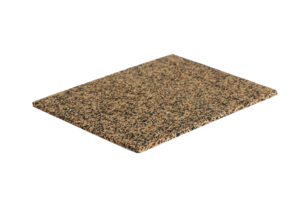Gummikork
Bei Gummikork handelt es sich um ein Korkgranulat-Kautschuk-Gemisch, welches mit PU gebunden wird. Die Herstellung erfolgt in einem mehrstufigen Verfahren, bei der der natürliche Kork in Kombination mit dem Gummigranulat unter Einfluss eines PU-Bindemittels zusammengefügt werden. Gummikork gilt vor allem dank der ökologischen und umweltverträglichen Herstellung als natürliches und recyclebares Dichtungsmaterial. Aufgrund des hohen Kautschuk-Anteils lässt sich der hochelastische und widerstandsfähige Werkstoff der Gruppe der Elastomerdichtungen zuordnen.

Verfügbare Gummikork-Materialien bei der Rehm Dichtungen Ehlers GmbH
Das PU-gebundene Korkgranulat-Kautschuk-Gemisch liegt uns in verschiedenen Materialdicken vor. Unser gesamtes Gummikork beziehen wir aus Europa.
Gummikork
Technisches Datenblatt:
Eigenschaften:
| Zugfestigkeit [KPa] | ISO 7322 | >=900 |
| Spezifisches Gewicht [kg/m³] | ISO 7322 | Ca. 650 |
| Rückfederung [%] | ISO 7322 | >=75 |
| Temperaturbereich [°C] | -20 – + 100 |
Die Eigenschaften von Gummikork als Dichtungsmaterial
Auch wenn Gummikork in verschiedenen Mischungsverhältnissen existiert, besitzt der Werkstoff eine Vielzahl an grundsätzlich identischen Eigenschaften. Das Korkgranulat-Kautschuk-Gemisch zeichnet sich durch eine gute Säure- und Witterungsbeständigkeit sowie eine bedingte Beständigkeit gegenüber Ozon und Laugen aus. Im Vergleich zu anderen Dichtungsplatten ist Gummikork durch seine Zusammensetzung abriebfest. Ebenso besitzt das Material eine hohe Dichte und mechanische Belastbarkeit, die es ermöglichen, Luft- und Schallgeräusche zu isolieren. Aus diesem Grund wird der Werkstoff, als schwingungsisolierendes Dichtungsmaterial, unter anderem zur Trittschalldämmung eingesetzt. Ein weiterer Vorteil umfasst die Druckfestigkeit und Maßhaltigkeit des Materials.
Die Vorteile und Materialeigenschaften auf einen Blick
Dichtungen und Rollen aus Gummikork zeichnen sich durch folgende Vorteile aus:
- Gute Säurebeständigkeit
- Gute Witterungsbeständigkeit
- Bedingte Beständigkeit gegenüber Ozon und Laugen
- Abrieb- und Druckfest
- Thermoisolierend
- Schall- und Wärmedämmend
Zusammengefasst ist Gummikork gegenüber diversen thermischen und mechanischen Belastungen widerstandsfähig. Dadurch ist das Dichtungsmaterial als schalldämmendes sowie thermoisolierendes Dichtungsmaterial für die unterschiedlichsten Einsatzzwecke geeignet.
Anwendungsgebiete von Gummikork-Dichtungen
Das Dichtungsmaterial wird in vielen Bereichen und Branchen verwendet. Der Werkstoff liegt als Rollenware vor. Als Dichtungshersteller schneiden wir diese vorrangig zu Flachdichtungen nach Bedarf zu.
Der Werkstoff wird vorzugsweise als Trittschalldämmung eingesetzt. Aufgrund des hohen spezifischen Gewichts und dem hohen Isolationsgrad kann das Dichtungsmaterial darüber hinaus auch als Wärmeisolierung genutzt werden. Durch seine Maßhaltigkeit und hohen Elastizität gleicht Gummikork Bodenunebenheiten aus und kann somit als Unterlage nahezu aller Böden verwendet werden.
Ob Gummikork auch für Ihre Zwecke geeignet ist, beantworteten wir Ihnen gern. Kontaktieren Sie dazu unseren Kundenservice, der Sie umfassend berät.
FAQ
Was ist Gummikork?
Gummikork ist ein Korkgranulat-Kautschuk-Gemisch, das mit Polyurethan gebunden wird. Es ist, aufgrund des hohen Kautschuk-Anteils, der Gruppe der Elastomerdichtungen zuzuordnen. Die wichtigste Eigenschaft des Dichtungsmaterials ist die Trittschalldämmung, resultierend aus der hohen Dichte des Werkstoffs.


